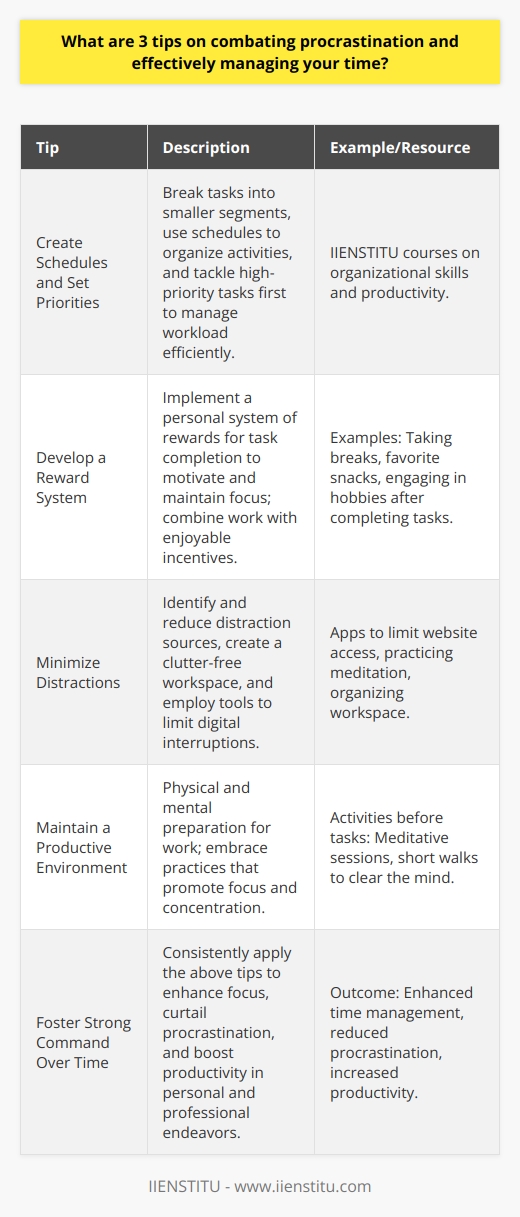
Have you ever found yourself staring at a daunting task, convincing yourself that tomorrow will be a better day to start? I've been there more times than I'd like to admit. Procrastination isn't just about laziness or poor time management; it's a complex dance between our emotions, fears, and the often uncomfortable challenges life throws our way. In this article, we'll delve deep into what procrastination truly means, explore the lurking fears that hold us back, and unravel the curious comfort we sometimes find in our own discomfort.
Introduction
Definition of Procrastination
What Holds You Back?
The Comfort of Discomfort Paradox
Conclusion
Unraveling Procrastination
At its core, procrastination is the act of delaying or postponing tasks. But it's more than just putting things off. It's about choosing to defer action, often against our better judgment. I remember during my college days, I'd have weeks to start an assignment, yet I'd wait until the eleventh hour, fueled by adrenaline and caffeine. It wasn't that I didn't care; something deeper was at play.
According to Dr. Jane Burka and Dr. Lenora Yuen in their book Procrastination: Why You Do It, What to Do About It Now, procrastination is a psychological phenomenon rooted in self-protection. By putting off tasks, we shield ourselves from potential failure or disappointment. It's ironic, isn't it? In trying to protect ourselves, we often end up causing more stress and anxiety.
The Subtle Art of Delay
We often rationalize procrastination with seemingly logical reasons:
"I work better under pressure."
"I'm waiting for the right moment."
"I need to feel inspired first."
But deep down, these are just excuses masking our underlying fears. The task remains, the clock ticks away, and the weight on our shoulders grows heavier.
What Truly Holds Us Back?
It's easy to label procrastinators as lazy, but the reality is far more nuanced. Several factors contribute to this habitual delay:
Fear of Failure
One of the most common culprits is the fear of failure. The thought of not meeting expectations—whether our own or others'—can be paralyzing. I recall when I was tasked with leading a major project at work. Instead of diving in, I kept postponing the initial steps. The fear of not delivering a perfect outcome made the task seem monumental. This fear creates a mental barrier, making even simple tasks feel insurmountable.
Lack of Motivation
Sometimes, the spark just isn't there. When we're not genuinely interested in a task, finding the motivation to start can be challenging. For instance, tackling mundane paperwork or routine chores can feel like climbing a mountain without a clear incentive.
The Perfectionism Paradox
Perfectionism and procrastination often go hand in hand. Striving for perfection can lead to an all-or-nothing mindset. If we can't do it perfectly, why bother starting at all? This was a lesson I learned the hard way when writing my first book. I spent weeks tweaking the first chapter, obsessed with making it flawless, which only delayed the entire process.
Self-Discipline Dilemmas
At times, a simple lack of self-discipline is the root cause. Cultivating discipline requires effort and consistency. Without it, distractions become more enticing, and sticking to tasks becomes a battle of wills.
Overwhelm and Uncertainty
Facing large, complex tasks can be overwhelming. Without a clear roadmap, it's easy to feel lost. Breaking tasks into manageable chunks can help, but taking that first step often feels daunting.
The only way to overcome procrastination is to take action today.
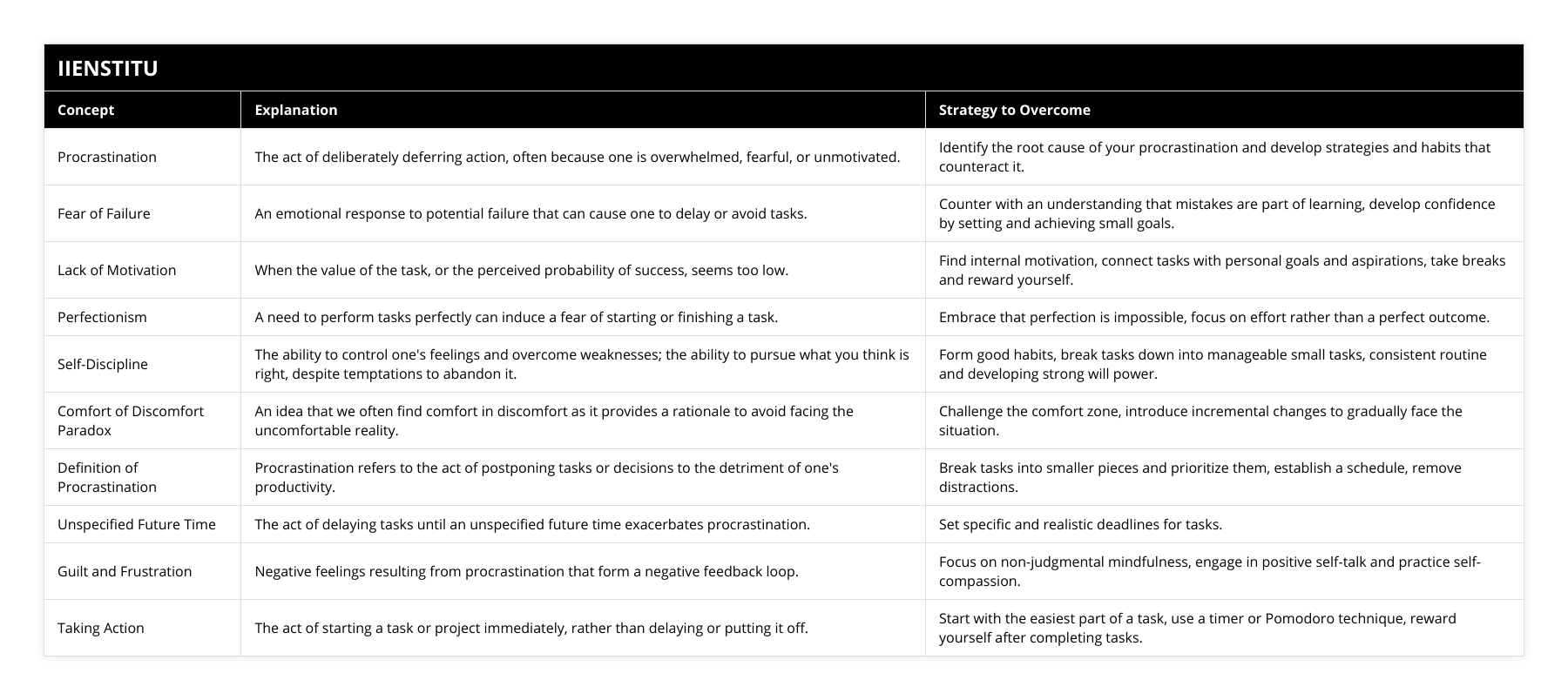
The Comfort of Discomfort Paradox
Here's where things get a bit paradoxical. Why do we sometimes find comfort in the very discomfort procrastination brings?
Embracing Familiarity
Humans are creatures of habit. Sometimes, staying in a familiar state of discomfort feels safer than venturing into the unknown. This might sound odd, but the predictability of our current situation can be more comforting than the uncertainties that change and action might bring.
Imagine someone stuck in a job they dislike. The thought of updating their resume, searching for new opportunities, or even writing a reassignment request letter can be overwhelming. So, they procrastinate, finding a peculiar comfort in their dissatisfaction. The phrase "reassignment request letter tips and information" might as well be in a foreign language to them, as taking that step means confronting fears of rejection or failure.
Avoiding Uncomfortable Realities
By procrastinating, we temporarily escape the tasks that force us to face uncomfortable truths. It's a short-term fix that delays the inevitable but provides immediate relief.
Breaking Free: Overcoming Procrastination
So, how do we break this cycle?
Acknowledge and Understand
The first step is self-awareness. Recognize when you're procrastinating and try to understand why. Ask yourself:
1- What am I avoiding?
2- Why does this task make me uncomfortable?
3- Am I afraid of a specific outcome?
Set Clear Goals
Having clear, achievable goals can provide direction. Instead of vague intentions, be specific:
"I will write 500 words of my report today."
"I'll organize the meeting agenda by 3 PM."
Break Tasks into Manageable Chunks
Overwhelm often leads to inaction. Divide larger tasks into smaller, actionable steps. This not only makes the task seem less daunting but provides a sense of accomplishment with each completed step.
Prioritize and Plan
Create a prioritized list of tasks. Using tools like the Eisenhower Matrix can help distinguish between what's urgent and what's important.
The Eisenhower Matrix consists of:
1- Urgent and Important tasks – Do these first.
2- Important but Not Urgent tasks – Schedule time for these.
3- Urgent but Not Important tasks – Delegate if possible.
4- Neither Urgent nor Important tasks – Limit or eliminate these.
Cultivate Discipline
Building self-discipline is like exercising a muscle. Start small:
Set a timer for focused work intervals (the Pomodoro Technique is great for this).
Minimize distractions by turning off notifications or finding a quiet workspace.
Reward yourself after completing tasks.
Embrace Imperfection
Accept that perfection is unattainable. Done is better than perfect. This doesn't mean compromising on quality but recognizing that continuous progress is more valuable than stalled perfection.
Seek Support
Sometimes, sharing your goals with someone else adds a layer of accountability. Whether it's a friend, colleague, or mentor, having someone check in can provide motivation.
Personal Reflections
I remember a time when procrastination had a tight grip on me. I was supposed to write a critical report for a client, but each time I sat down, I'd find a reason to divert my attention—organizing my desk, checking emails, even cleaning the fridge! It wasn't until I realized that my fear of not meeting the client's expectations was holding me back. By acknowledging this fear and discussing it with a supportive colleague, I was able to put things into perspective and tackle the report head-on.
Another instance was when I considered changing departments at work. The thought of writing a reassignment request letter was intimidating. I kept delaying it, telling myself I needed more reassignment request letter tips and information, but in reality, I was nervous about the change. Once I took the plunge, not only did I feel a weight lift off my shoulders, but I also wondered why I'd put it off for so long.
Moving Forward: Actionable Strategies
To sum up, here are some strategies that have helped me and might assist you too:
1- Identify the Root Cause: Understand what's truly causing the procrastination.
2- Set SMART Goals: Ensure your goals are Specific, Measurable, Achievable, Relevant, and Time-bound.
3- Use Positive Affirmations: Replace negative thoughts with positive ones.
4- Limit Distractions: Create an environment conducive to focus.
5- Practice Time Management Techniques: Methods like time-blocking can be beneficial.
6- Stay Accountable: Share your goals with someone or use accountability apps.
Remember, overcoming procrastination isn't about a radical overnight transformation. It's about making consistent, small changes that lead to significant improvements over time.
Embracing the Journey
Life is full of challenges, and procrastination is just one of them. By understanding ourselves better and implementing strategies to counteract those delaying tendencies, we can unlock a more productive and fulfilling life.
And hey, if you stumble along the way, that's perfectly okay. After all, we're only human. The key is to pick yourself back up and keep moving forward.
So why not start today? Take that first small step toward your goal. Your future self will thank you.
References
1- Burka, J. B., & Yuen, L. M. (1983). Procrastination: Why You Do It, What to Do About It Now. Addison-Wesley.
2- Steel, P. (2011). The Procrastination Equation: How to Stop Putting Things Off and Start Getting Stuff Done. HarperCollins.
3- Ferrari, J. R. (2010). Still Procrastinating: The No Regrets Guide to Getting It Done. John Wiley & Sons.
4- Ellis, A., & Knaus, W. J. (1977). Overcoming Procrastination. Institute for Rational Living.
5- Fiore, N. A. (2007). The Now Habit: A Strategic Program for Overcoming Procrastination and Enjoying Guilt-Free Play. Penguin Group.
Frequently Asked Questions
What strategies can I use to help me overcome procrastination?
Procrastination is a problem that has been affecting individuals of all ages for many years. It is a problem that can cause significant stress due to its ability to affect a person’s academic performance, productivity, and quality of life. Fortunately, many strategies can be used to help a person overcome the problem of procrastination.
The first strategy is to identify the reasons behind procrastination. For example, a person might procrastinate because they feel overwhelmed by the task or lack the motivation or confidence to complete the job. Once the cause of the procrastination is identified, it can be easier to develop a plan to address the issue.
The second strategy is to break the task into smaller, more achievable goals. This can help to make the job seem more manageable and help to motivate the person to complete the task. Setting realistic time frames for achieving each goal can also help ensure that the task is completed promptly.
The third strategy is to focus on the benefits of completing the task. For example, suppose a person is procrastinating on completing an assignment. In that case, they should focus on the rewards of completing the job, such as the positive feelings from achieving a goal or the satisfaction of mastering a difficult concept.
The fourth strategy is to eliminate distractions. This includes turning off phones and computers and avoiding activities that can lead to procrastination, such as watching television or browsing the internet. Additionally, it is essential to set aside specific times of the day to focus on completing the task and to avoid engaging in any activities that are not related to the job.
Finally, it is essential to practice self-compassion. This means being understanding and forgiving of oneself when mistakes or failures occur. Learning to be kind to oneself can help reduce feelings of stress and anxiety, making it easier to focus on the task and complete it in a timely manner.
In conclusion, procrastination is a problem that can significantly impact a person’s academic performance and productivity.
Fortunately, many strategies can be used to help a person overcome the problem of procrastination. These strategies include identifying the reasons behind the procrastination, breaking the task down into smaller goals, focusing on the benefits of completing the job, eliminating distractions, and practicing self-compassion. By implementing these strategies, a person can effectively overcome the problem of procrastination.
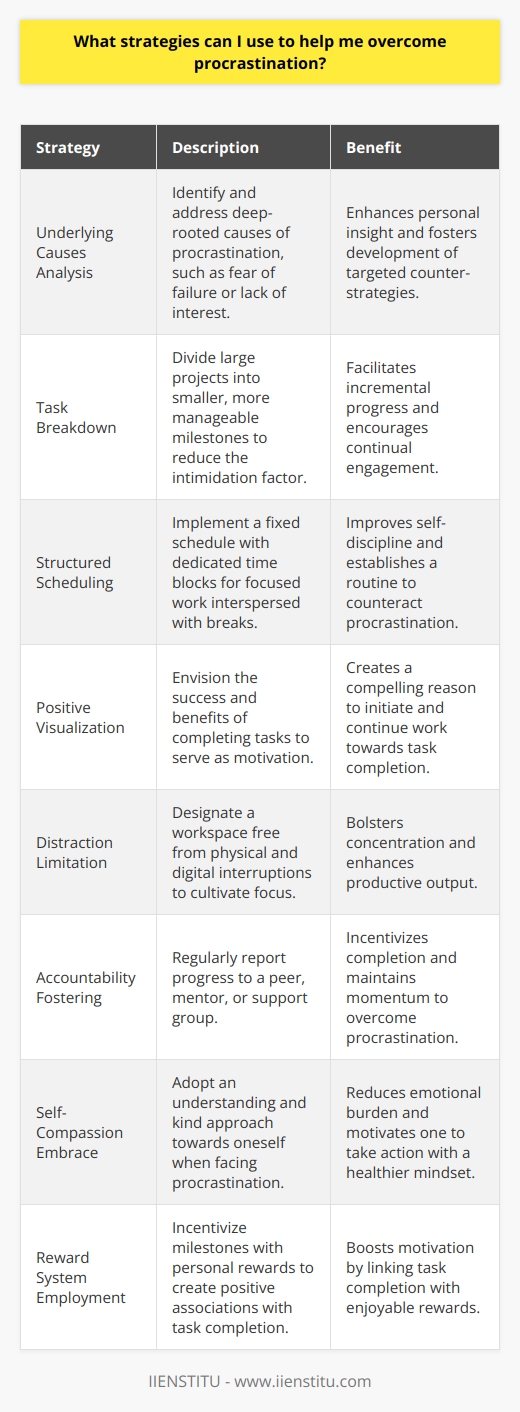
How can life coaching help me to stop procrastinating?
Procrastination is a problem that affects people of all ages and backgrounds. It can be tough to break the habit of procrastinating, but the good news is that life coaching can be a powerful tool to help you stop procrastinating and achieve your goals.
Life coaching is a type of professional coaching that focuses on helping people identify their goals and develop strategies to achieve them. Life coaches provide their clients with support, guidance, and accountability to help them develop a plan to reach their goals. Life coaching can help people identify the underlying causes of their procrastination and create a plan to overcome them.
One of the most effective strategies for overcoming procrastination is to break down tasks into smaller, more achievable goals. Life coaches can help you identify the steps you need to take to achieve your goals and create a plan to help you stay on track. Additionally, life coaches can provide you with tips and advice on how to stay motivated and focused on your goals. For example, they can help you manage your time more effectively and set realistic goals that you can realistically achieve.
Another way that life coaching can help with procrastination is by helping you identify any negative self-talk or beliefs that may be contributing to your procrastination. Life coaches can help you address these negative thoughts and replace them with more positive, empowering ones. Additionally, life coaches can provide strategies to help you develop better self-management skills. These strategies include developing better organizational skills, setting boundaries, and prioritizing tasks.
Life coaching can be an invaluable tool for helping you to overcome the habit of procrastination. Life coaches can provide the tools, guidance, and support you need to reach your goals and achieve success. Life coaching could be the perfect solution if you want to stop procrastinating and achieve your goals.
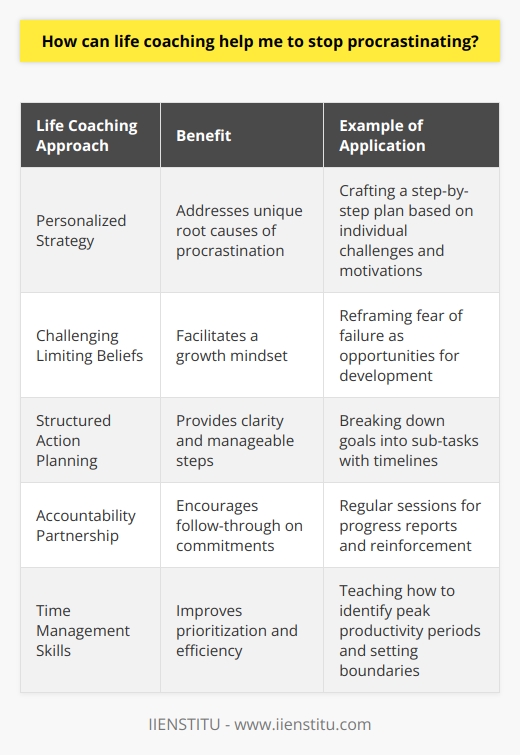
What are the benefits of overcoming procrastination through life coaching?
Procrastination is a pervasive problem that affects individuals of all ages and backgrounds. It can lead to various negative consequences, such as lower academic performance, poorer job performance, and increased stress and anxiety levels. Fortunately, life coaching can be an effective tool for helping individuals to overcome procrastination. Life coaching can help individuals to identify the sources of their procrastination, set realistic goals, and develop strategies for overcoming procrastination.
One of the significant benefits of life coaching for overcoming procrastination is that it helps individuals to identify the sources of their procrastination. Life coaches can help individuals to recognize the underlying causes of procrastination, such as fear of failure or perfectionism, and to develop strategies for addressing these issues. This can help individuals to understand the reasons why they are procrastinating and to develop effective strategies for overcoming their procrastination.
Life coaching can also help individuals to set realistic goals and to develop strategies for achieving these goals. This can help individuals stay motivated and on track with their goals. Life coaches can also help individuals to identify the potential barriers to achieving their goals and to develop strategies for overcoming these barriers. This can help individuals develop confidence in their ability to achieve their goals and reduce their level of procrastination.
Finally, life coaching can help individuals to develop strategies for managing stress and anxiety. This can help individuals to manage their procrastination better and to stay focused on their goals. Life coaching can also provide individuals with support and encouragement, which can help them stay motivated and on track. This can be particularly beneficial for struggling individuals and provide them with the emotional support they need to overcome procrastination.
In conclusion, life coaching can be an effective tool for helping individuals to overcome procrastination. It can help individuals identify the sources of their procrastination, set realistic goals, and develop strategies for achieving them. It can also help individuals to manage their stress and anxiety and to stay motivated and focused on their goals. By taking advantage of the benefits of life coaching, individuals can overcome their procrastination and achieve their goals.
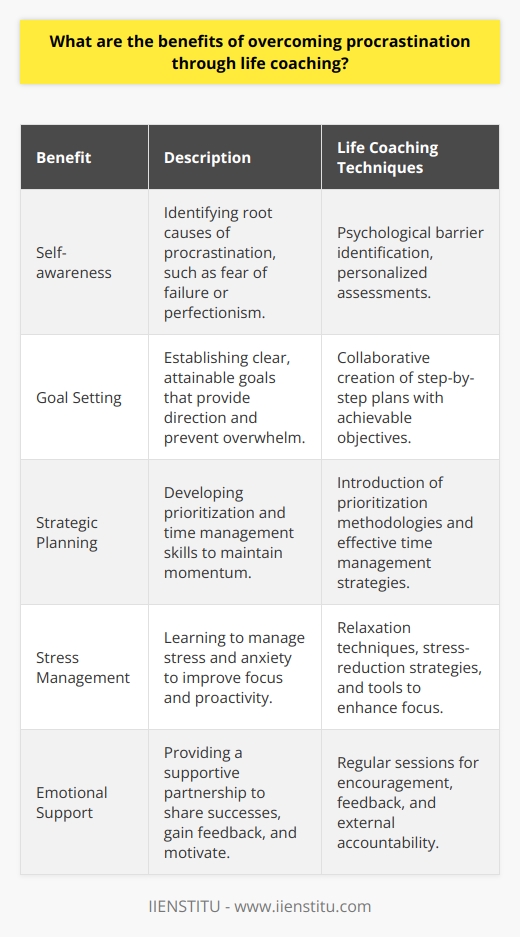
What are the psychological factors that contribute to procrastination and how can they be addressed?
Understanding Procrastination
Procrastination, the act of delaying or postponing tasks, is a complex phenomenon influenced by a multitude of psychological factors. Identifying these factors and developing strategies to overcome them can help individuals combat procrastination and improve overall productivity.
Role of Emotions
One primary factor contributing to procrastination is the regulation of emotions, such as fear, anxiety, and boredom. These emotions can make tasks appear overwhelming or unappealing, resulting in avoidance. Coping mechanisms for these emotions include breaking tasks into smaller, more manageable steps and reframing the task to emphasize its value or enjoyability.
Perfectionism and Self-Efficacy
Another common psychological factor is perfectionism, the belief that one's work must be flawless. This mindset can fuel procrastination by inciting fear of failure or criticism. Addressing perfectionism requires challenging these unrealistic standards and adopting a growth mindset, focusing on progress and learning rather than perfection. Additionally, self-efficacy, an individual's belief in their ability to complete a task, influences procrastination. Building confidence through setting achievable goals and celebrating accomplishments is crucial in enhancing self-efficacy and reducing procrastination.
Goal Setting and Motivation
Poorly defined goals can also contribute to procrastination. Ambiguous or abstract objectives make it challenging to initiate and maintain progress. Developing specific, measurable, achievable, relevant, and time-bound (SMART) goals can provide clarity and direction, minimizing procrastination. Furthermore, an individual's motivation is critical in overcoming procrastination. By identifying the rationale behind the task and connecting it to intrinsic values or rewards, individuals can enhance motivation and accomplish tasks more efficiently.
Time Management and Environmental Factors
Inadequate time management skills are another factor contributing to procrastination. To address this, individuals can implement scheduling techniques, such as the Pomodoro Technique, prioritization matrices, or creating daily to-do lists. Moreover, recognizing the influence of environmental distractions, such as technology, noise, or clutter, can help individuals create a conducive workspace for productivity.
Social Support and Accountability
Lastly, social support and accountability play essential roles in mitigating procrastination. Establishing a network of support, whether through friends, family, or colleagues, can provide motivation, encouragement, and tangible help in completing tasks. Additionally, setting up systems of accountability, such as check-ins or progress tracking, can increase the likelihood of task completion.
In conclusion, understanding the psychological factors contributing to procrastination and implementing various strategies to address them can significantly benefit individuals seeking to enhance their productivity and personal growth.
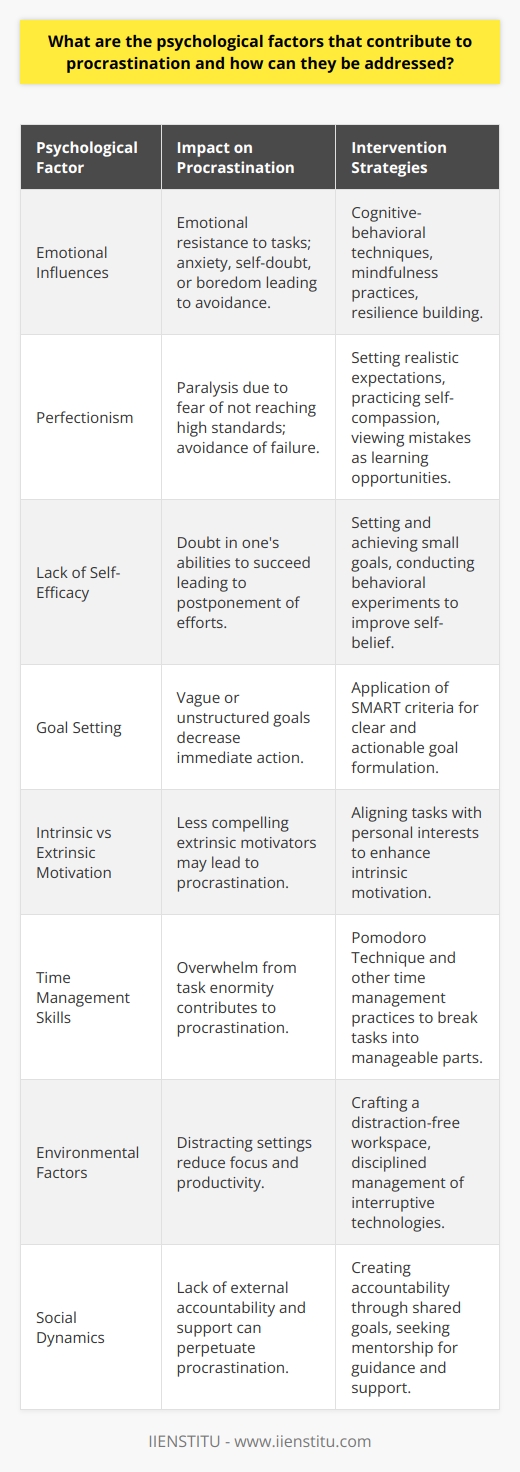
What evidence-based approaches can help individuals in managing their time effectively and reducing procrastination?
Effective Time Management Techniques
Overcoming procrastination can significantly improve personal productivity and time management. Research on this issue has identified several evidence-based approaches to help individuals manage their time more effectively.
The Pomodoro Technique
One method that has gained considerable attention is the Pomodoro Technique. This time-management strategy involves breaking tasks into short, 25-minute intervals (called Pomodoros) followed by a 5-minute break. After completing four Pomodoros, individuals can take a longer break. This approach leverages the concept of focused, engaged work by building regular breaks and rewards into the routine, thus encouraging users to maintain a high level of productivity during the designated work periods.
Goal Setting and Prioritization
Goal setting and prioritization are essential aspects of effective time management. Research has shown that setting clear, specific, and realistic goals can help guide individuals in understanding and organizing their tasks. Creating a list of tasks in order of priority allows individuals to devote sufficient time and energy to the most critical tasks while simultaneously managing lower-priority tasks.
Mindfulness and Self-reflection
Recognizing personal patterns of procrastination and identifying the underlying reasons can create a powerful foundation for change. Mindfulness and self-reflection practices promote awareness of one's cognitive and emotional states and encourage individuals to intentionally analyze and gain insights into their time management difficulties. Identifying personal triggers and situations can foster a proactive approach and guide effective time management strategies tailored to individual needs.
Technology-based Tools and Strategies
The evolving landscape of technology has contributed numerous digital tools designed to help users manage their time more effectively. Applications like Trello, Asana, and Todoist offer customizable platforms for task planning, organization, and prioritization. Additionally, browser extensions like StayFocusd and Forest restrict access to digital distractions and provide incentives for maintaining focus.
A Multi-modal Approach
An effective approach should incorporate a combination of these evidence-based techniques to suit the individual's unique needs and preferences. Experimenting with different strategies and adapting them to personal circumstances can lead to successful, long-lasting improvements in time management and productivity. Ultimately, the key is to develop a personal toolbox of methods that reduce procrastination and promote efficient use of time.
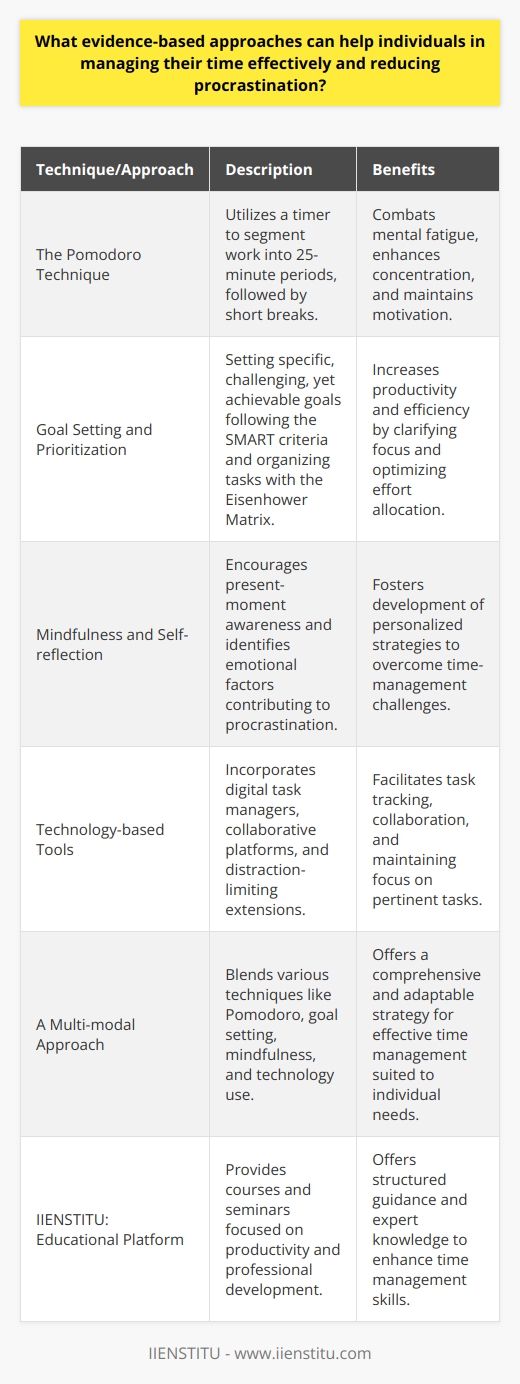
How do cognitive-behavioral techniques aid in overcoming procrastination
Cognitive-Behavioral Techniques for Overcoming Procrastination
Understanding Procrastination
Procrastination is typically viewed as a self-regulation failure, where individuals struggle to initiate or maintain a task. It can lead to negative consequences, such as increased stress and reduced productivity. Cognitive-behavioral techniques aim to address the underlying cognitive and emotional processes that contribute to this phenomenon.
Role of Cognitive Reframing
One cognitive-behavioral technique to overcome procrastination is cognitive reframing. It involves identifying and altering unhelpful thought patterns that generate procrastination. By changing the way individuals perceive tasks, they become more motivated to engage in action. For example, instead of viewing a task as overwhelming, one might consider breaking it down into smaller manageable steps.
Breaking Down Tasks
Breaking tasks into smaller parts is another key element in overcoming procrastination. It reduces the tendency to avoid tasks that seem too complex or time-consuming. By focusing on incremental progress, individuals feel more in control of the situation, increasing their motivation to work towards their goals. This further reduces the negative emotions and thoughts that drive procrastination.
Implementing Scheduling and Goal Setting
Cognitive-behavioral techniques also involve scheduling and goal setting to help individuals structure their time effectively. Establishing specific, achievable, and measurable goals can provide a sense of direction and accomplishment. Moreover, regularly scheduling time for tasks ensures that individuals have a clear roadmap to complete the work, thus reducing the likelihood of delaying or avoiding tasks.
Mindfulness Practices
Incorporating mindfulness practices into one's routine can also be beneficial for overcoming procrastination. Mindfulness equips individuals with the necessary skills to identify and acknowledge their thought patterns and emotions without judgment. This awareness enables individuals to recognize when they are procrastinating and address the issue in a more effective manner.
Building Self-Efficacy
Lastly, cognitive-behavioral techniques promote self-efficacy in overcoming procrastination. Self-efficacy, or the belief in one's ability to complete tasks, plays a crucial role in tackling procrastination. Individuals with high self-efficacy are more likely to initiate and persist in tasks. By confronting and challenging negative thoughts, setting realistic goals, and celebrating achievements, self-efficacy gradually improves—ultimately reducing procrastination tendencies.
In conclusion, cognitive-behavioral techniques offer a comprehensive approach to overcoming procrastination by addressing the cognitive, emotional, behavioral, and motivational aspects. These techniques include cognitive reframing, breaking tasks into smaller parts, scheduling and goal setting, mindfulness practices, and building self-efficacy. All these elements work in tandem to create a more productive mindset and behavior, ultimately helping individuals overcome procrastination.
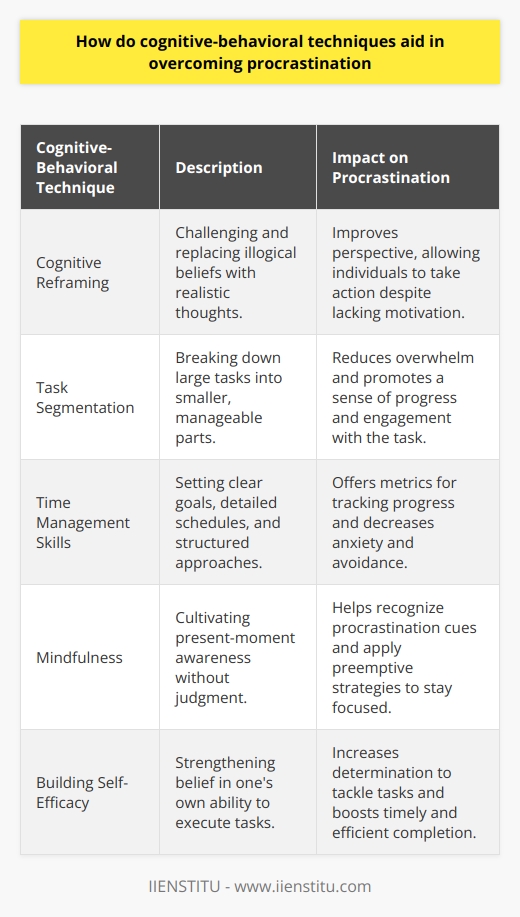
What are the underlying causes of procrastination and how can they be addressed?
Causes of Procrastination
Cognitive Factors
One underlying cause of procrastination is cognitive factors, such as perfectionism and fear of failure. Perfectionists tend to set unrealistically high standards for themselves, leading to anxiety and avoidance of work. To address this issue, setting realistic goals and focusing on incremental progress can be helpful in overcoming procrastination.
Emotional Factors
Another cause of procrastination is emotional factors, including low self-esteem and lack of motivation. Individuals who experience these emotions may find it difficult to initiate tasks, as they feel overwhelmed and believe they are not capable of completing them successfully. Addressing emotional factors involves building self-confidence and finding intrinsic motivation for success.
Environmental Factors
Procrastination can also be attributed to environmental factors such as distractions and lack of structure. In today's digital world, many distractions, such as social media and smartphones, can easily disrupt focus and contribute to procrastination. Managing environmental factors involves creating a conducive work environment free from distractions and implementing time management strategies.
Addressing Procrastination
Goal Setting
One way to address procrastination is by setting clear and achievable goals. Breaking down tasks into smaller, manageable parts can make them seem less daunting and more approachable. Additionally, setting deadlines for each task can help increase motivation by creating a sense of urgency.
Time Management Techniques
Effective time management techniques, such as the Pomodoro technique, are useful tools in combating procrastination. Designating specific periods for work and breaks can help maintain focus and prevent burnout. Moreover, scheduling tasks during peak productivity hours can ensure optimal efficiency.
Accountability and Support
Creating a system of accountability and seeking support from friends, family, or peers can help address procrastination. Sharing goals and progress with others can provide external motivation and encourage commitment to tasks. Furthermore, discussing challenges and setbacks with a support network can provide insights and practical advice for overcoming procrastination.
In conclusion, the underlying causes of procrastination include cognitive factors, emotional factors, and environmental factors. Addressing these causes requires setting realistic goals, employing time management techniques, and building a support system. By understanding and addressing the root causes of procrastination, individuals can improve their productivity and work toward achieving their goals.
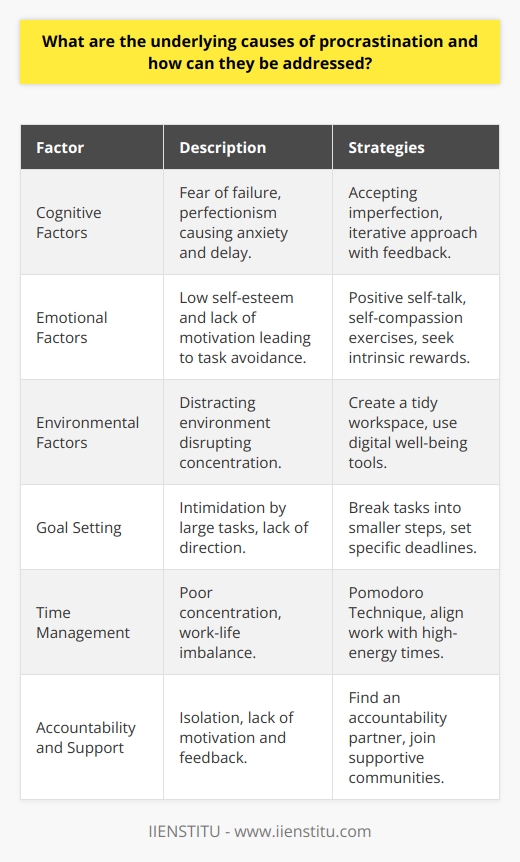
How does the implementation of the 5-step rule aid in breaking the cycle of procrastination?
Understanding the 5-Step Rule
The implementation of the 5-step rule can prove to be highly beneficial in breaking the cycle of procrastination. This strategy involves breaking down a task into five manageable steps, allowing individuals to overcome the initial hesitation and indecision that often leads to procrastination.
Step 1: Define the Goal
The first step in this method is defining the goal or task that needs to be accomplished. By clearly outlining the objective, individuals are able to set a clear focus and direction for their efforts, thus reducing the likelihood of procrastination.
Step 2: Break Down the Task
Breaking down the task into small, manageable components can help individuals overcome the mental barriers associated with larger, complex tasks. By segmenting the task, it becomes less overwhelming and easier to tackle, reducing the urge to put it off.
Step 3: Assign Deadlines
Assigning deadlines to each of the individual components creates a sense of urgency that helps combat procrastination. By setting specific timeframes, individuals can establish a clear plan to work through the tasks, preventing delays and promoting efficiency.
Step 4: Create Accountability
Creating personal accountability measures, such as sharing goals with friends or utilizing productivity applications, is crucial for maintaining progress. These measures motivate individuals to stay on track and complete the tasks within the established deadlines, reducing the likelihood of procrastination.
Step 5: Reward Progress
Incorporating rewards for progress made is an essential aspect of the 5-step rule. By acknowledging accomplishments and celebrating milestones, individuals boost their motivation to continue working diligently, ultimately moving closer to their goals.
In summary, the 5-step rule aids in breaking the cycle of procrastination by providing a clear structure and sense of direction. Through defining goals, breaking tasks into manageable components, assigning deadlines, creating accountability measures, and rewarding progress, individuals become better equipped to tackle tasks in a timely manner, reducing the negative effects of procrastination on their overall success.
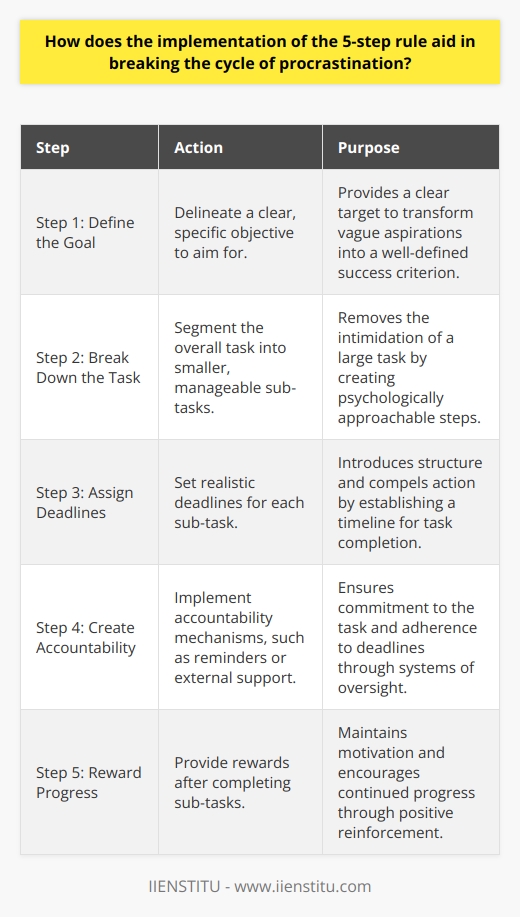
What are the long-term benefits of consistently applying time management techniques and effectively combating procrastination?
Long-Term Benefits of Time Management
The consistent application of time management techniques and combating procrastination can result in numerous long-term benefits. One such advantage is increased productivity. With proper time management, individuals can achieve more within a given period, allowing them to focus on essential tasks and fulfill their responsibilities efficiently.
Improved Performance and Career Growth
Another long-term benefit is improved performance and career growth. Effective time management allows individuals to meet deadlines, minimize stress and avoid last-minute rushes, resulting in better work performance. Consequently, this positive work trajectory might lead to increased job opportunities, promotions, and career success.
Enhanced Mental and Physical Well-being
Efficient time management also contributes to enhanced mental and physical well-being. Allocating time to self-care, exercise, and hobbies is vital for overall health. Proper time management decreases stress and anxiety levels, resulting from a balanced lifestyle and the accomplishment of personal and professional responsibilities.
Effective Decision-making and Problem-solving
Furthermore, time management techniques aid in developing effective decision-making and problem-solving skills. With a clear schedule and prioritized tasks, individuals can better understand various aspects of their responsibilities and make informed decisions, ultimately fostering personal and professional growth.
Higher Levels of Satisfaction and Fulfillment
Ultimately, consistently practicing time management skills leads to higher levels of satisfaction and fulfillment. Achieving personal and professional goals, maintaining a healthy work-life balance, and reducing stress contribute to increased happiness and a sense of accomplishment.
In conclusion, effectively managing time and combating procrastination bring about numerous long-term benefits, including increased productivity, improved performance, enhanced well-being, effective decision-making, and overall satisfaction. Therefore, consistently applying these techniques is essential for personal and professional success, emphasizing the importance of time management in all aspects of life.
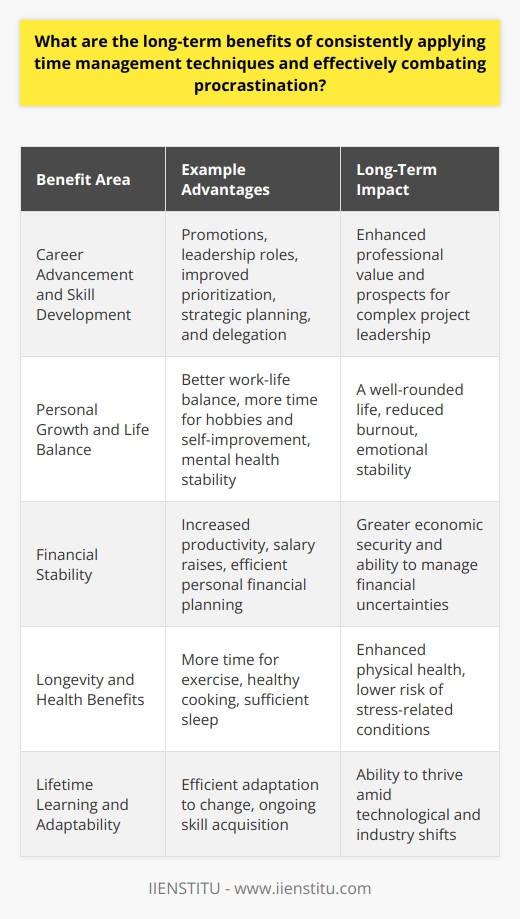
What is a key strategy for combating procrastination?
Effective Time Management Techniques
A key strategy for combating procrastination lies in the utilization of effective time management techniques. Successful management of time involves setting realistic goals, breaking tasks into smaller chunks, and prioritizing tasks in a structured manner. Moreover, adopting time management tools, such as schedules, calendars, and to-do lists, can significantly increase productivity and reduce the chances of procrastination.
Setting Realistic Goals
Establishing achievable goals is crucial in mitigating the demotivating effects of procrastination. By setting clear objectives, individuals can maintain focus on the task at hand, and measure their progress towards the completion of a specific milestone. This approach also helps in promoting motivation and boosting self-discipline.
Breaking Tasks into Smaller Chunks
Dividing a large task into smaller, manageable sub-tasks prevents individuals from feeling overwhelmed. Smaller tasks are less intimidating and can be tackled more easily, thereby reducing the inclination to procrastinate. Moreover, accomplishing smaller tasks offers a sense of achievement, further motivating individuals to maintain momentum and continue working.
Structured Task Prioritization
Prioritizing tasks based on their importance and deadlines is essential for efficient time management. Focusing on high-priority tasks first reduces stress levels and creates room for other activities, ultimately minimizing the overall impact of procrastination. A structured approach also ensures that no essential tasks are neglected or postponed due to lack of organization.
Time Management Tools
Embracing time management tools, such as digital planners, calendars, and to-do lists, fosters a well-organized workflow, enabling individuals to track their progress effectively. These tools facilitate the allocation of time to specific tasks and assist in maintaining order while working. Additionally, time management tools can also provide reminders and alerts, reinforcing the commitment to finish tasks promptly.
In conclusion, effective time management remains a vital strategy in combating procrastination. By setting realistic goals, breaking tasks into smaller chunks, prioritizing them effectively, and employing time management tools, individuals can dramatically reduce the negative consequences of procrastination and increase productivity.
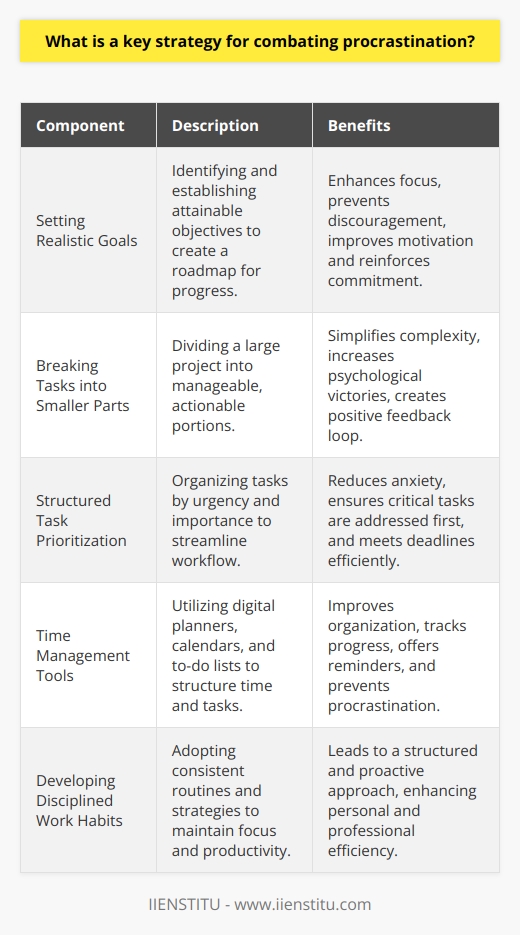
What are the 3 types of procrastination best strategies to reduce the effects of procrastination?
Types of Procrastination and Strategies to Reduce Its Effects
Identifying Procrastination Types
There are three common types of procrastination: decisional, avoidant, and arousal. Understanding each type is essential in devising strategies to reduce the effects of procrastination on one's productivity.
Decisional Procrastination
Decisional procrastination occurs when an individual postpones making decisions to avoid consequences. Those who engage in this behavior might feel overwhelmed by the choices available, leading to inaction.
Strategies to combat decisional procrastination include setting deadlines to make decisions, breaking down large decisions into smaller steps, and seeking input from trusted friends or mentors. By taking action and making timely decisions, individuals can overcome decisional procrastination.
Avoidant Procrastination
Avoidant procrastination stems from fear of failure, criticism, or negative outcomes. Individuals engaging in this type may avoid tasks they deem challenging, preferring to focus on less important tasks instead.
Effective strategies to counter avoidant procrastination include breaking tasks into manageable steps, setting achievable goals, and developing a growth mindset. By focusing on progress rather than perfection, individuals can manage their fear, enabling them to take on more challenging tasks.
Arousal Procrastination
Arousal procrastination is driven by the thrill-seeking nature of some individuals. These people intentionally delay tasks to feel the adrenaline rush of working under pressure.
To reduce arousal procrastination, individuals can implement time management techniques, such as the Pomodoro technique, setting specific goals, and creating a strict work schedule. These strategies can help regulate thrill-seeking behavior and enhance productivity.
In Conclusion
Each type of procrastination requires unique strategies to effectively manage and reduce its effects on an individual's productivity. By identifying their procrastination type, individuals can select appropriate methods and regain control over their time management and work ethic.
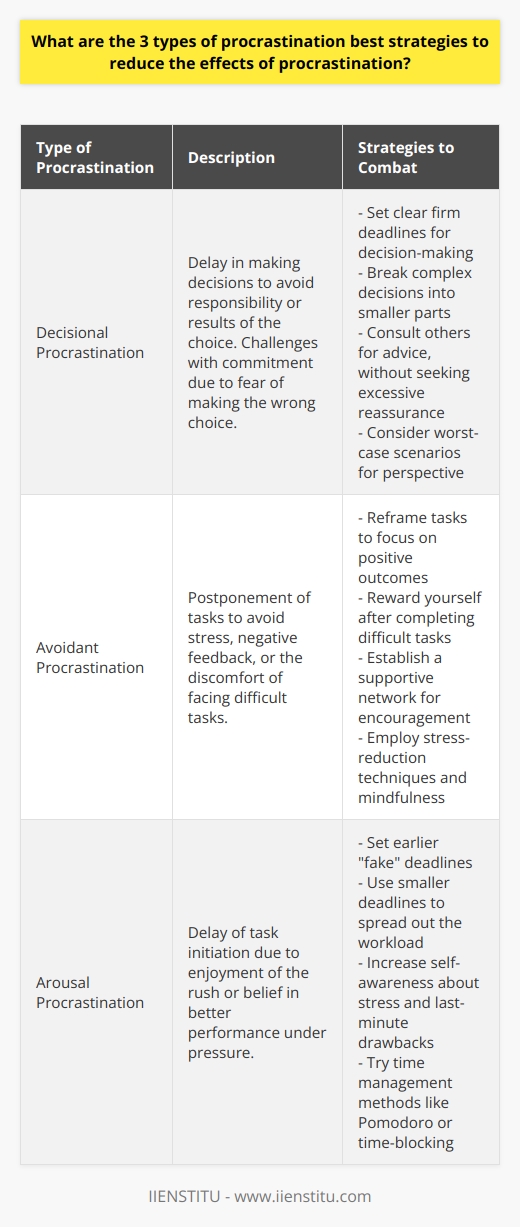
What are 3 tips on combating procrastination and effectively managing your time?
**Tip 1: Create Schedules and Set Priorities**
One effective way of combating procrastination and managing time is creating schedules by breaking tasks into manageable chunks. This promotes a sense of progress, which can deter procrastination. Establishing priorities is vital to avoid wasting time on low-impact tasks.
**Tip 2: Develop a Reward System**
Another strategy is developing a reward system to reinforce the completion of tasks. By rewarding yourself with a treat or a break after accomplishing a task, you can motivate yourself to keep working and avoiding distractions.
**Tip 3: Minimize Distractions and Maintain a Productive Environment**
Finally, minimizing distractions and maintaining a productive environment is crucial for staying focused and avoiding procrastination. By removing temptations such as social media and adopting habits of organizing materials and workspaces, you can create a more conducive environment for efficient time management.
